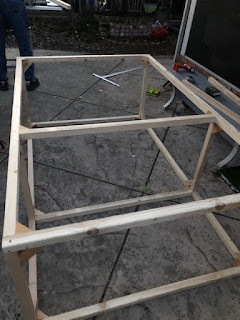The Coop
First post! Woohoo!
Anyhoo. I built a coop for my incoming quail.
Quail are ground dwellers that do not nest like chickens. That automatically meant that the coop needed floor space as opposed to height. We decided that two distinct rooms was best. One would be their "indoor" space, and the other, the "outdoor" space.
The indoor space would have a removable dividing wall, removable doorway, and a sand tray for bathing. The outdoor space would have edible plants, a small hut, and space to dig for bugs.
The hardware cloth was decently expensive as we needed to cover almost all of the coop including the floor. A cost saving measure would include having more solid walls. We chose not to do this, though. We wanted to give the birds a life as close to natural as possible.
The lives my birds live is important to me. They do not simply exist to provide me their eggs and meat. They are living, breathing animals that are deserving of a happy life. Because of this very firm commitment to my animal's comfort, I made sure to provide them with more than enough. For me and my farming goals, the minimum standard is not nearly good enough.
Anyhoo. I built a coop for my incoming quail.
Planning
My grandfather and I went into this project with one thing in mind. "What do the babies need?" If I had chosen chickens, this coop would have ended up very different, but because I chose quail, I needed to modify the coop plan accordingly.Quail are ground dwellers that do not nest like chickens. That automatically meant that the coop needed floor space as opposed to height. We decided that two distinct rooms was best. One would be their "indoor" space, and the other, the "outdoor" space.
The indoor space would have a removable dividing wall, removable doorway, and a sand tray for bathing. The outdoor space would have edible plants, a small hut, and space to dig for bugs.
Materials
The materials we used were mostly 1"x1" lumber, scrap plywood sheets, and hardware cloth. You could purchase thin trim to line the edges in order to predator-proof the coop, but we just bought extra 1"x1" and used a table saw to cut thin edging. It saved quite a bit of money.The hardware cloth was decently expensive as we needed to cover almost all of the coop including the floor. A cost saving measure would include having more solid walls. We chose not to do this, though. We wanted to give the birds a life as close to natural as possible.
Considerations
When making design choices for my coop, I simply looked to nature. In the wild, a quail would scratch at the ground for bugs. Knowing this, I provided them with access to the dirt. In the wild, a quail would look for places to take cover that are on the ground. I provided them with multiple places to feel secure. Quail don't make nests, but prefer to lay directly on the ground, so I omitted nesting boxes. I added enrichment for them to mimic nature. I have a container with sand for bathing, a hanging branch to perch on, and the occasional frozen veggie ball for entertainment.The lives my birds live is important to me. They do not simply exist to provide me their eggs and meat. They are living, breathing animals that are deserving of a happy life. Because of this very firm commitment to my animal's comfort, I made sure to provide them with more than enough. For me and my farming goals, the minimum standard is not nearly good enough.







Comments
Post a Comment